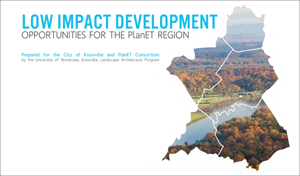UT Releases Guide To Protect Region's Water Resources
A group of researchers from the University of Tennessee released an educational guide on low-impact development (LID) last week.

The study, conducted by the Landscape Architecture Program, examines the region's water resources and different ways to handle stormwater runoff.
UT's guide, Low-Impact Development: Opportunities for the PlanET Region, will help municipalities, developers and the general public meet stricter Clean Water Act standards that require on-site control of stormwater runoff, a non-point source pollutant. Throughout PlanET's public input process, residents have picked clean water among their top priorities.
According to the UT study, the area's lakes, streams, wetlands and reservoirs serve many functions, from navigation to hydropower generation and from recreation to fish habitat to drinking water supply. Shared water resources cross city, county and state lines and need careful management and stewardship.
Conventional stormwater management has included detaining water or flushing runoff into local waterbodies after rain events. Runoff is often laden with contaminants that range from heavy metals to nitrogen and phosphorus.
The LID approach to stormwater control mimics natural processes, such as those of wetlands that remove contaminants through infiltration before they reach local waters.
UT's visually rich guide describes several LID best practices that capture, infiltrate and/or reuse stormwater runoff from various land uses in the region. One such practice is permeable paving, which allows water to flow through hard, paved surfaces, allowing infiltration of stormwater.
Also included in the guide are rain gardens and constructed wetlands, which are typically planted with native species. These meet the functional needs of stormwater control and are aesthetic alternatives that provide habitat. They also serve as educational tools when used in parks and schools, such as the Norris Elementary wetland in Anderson County.
The UT work was undertaken as part of the PlanET demonstration project series. The LID guide is available for download via the PlanET website. Copies are also at public libraries throughout the PlanET region.